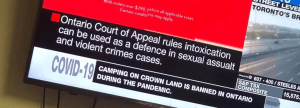Top Rated Criminal Lawyers | Call Us 24/7 AT (416) 658-1818
A recent Ontario Court of Appeal decision regarding the intoxication defence in assault cases has sparked a public outcry after media coverage on the case. CP24 headlines read that “intoxication can now be used as a defence in sexual assault and violent crimes cases.”
But is this headline the whole story? In this article, we explore the limits of the intoxication defence in assault cases and explore how this recent case has shaped how the defence may be used.

After news of the case surfaced, there was an outcry from the public who were worried about sexual assault perpetrators now being able to use intoxication as an excuse for sexual assault. But that’s not necessarily the case.
In proving that an accused committed an offence such as assault beyond a reasonable doubt, the Crown must establish both the actus reus (guilty act) and mens rea (guilty mind) elements of the offence.
Intoxication is not a defence to most crimes in Canada, but the common law defence of non-mental disorder automatism provides a defence for an accused based on reaching a level of intoxication such that the person’s actions were not of their own mind.
This means that an accused was in such an intoxicated state that they actions were performed autonomously and were no longer voluntary. If their actions were not voluntary, then the “guilty mind” element of the offence could not be established and an accused could not be criminally liable.
However, s. 33.1 of the Criminal Codes provided a limitation on this defence. This provision was introduced in 1995 by Bill C-72 and reads:
“It is not a defence ... that the accused, by reason of self-induced intoxication, lacked the general intent or the voluntariness required to commit the offence, where the accused departed markedly from the standard of care...”
This section of the Criminal Code essentially removed the defence of non-mental disorder automatism where an accused was intoxicated as a result of their own voluntary actions in cases of assault or bodily interference.
This limitation sounds reasonable. After all, when a person voluntarily consumes a substance, they should be held responsible for any actions which may subsequently occur. This amendment to the Criminal Code was made after the case of R v Daviault in which a severely drunken individual sexually and violently assaulted a helpless individual and the Court held that severe intoxication could be used as a defence.
But this limitation is complicated. What about an adverse drug reaction? People consume substances every day and face adverse consequences that they would never have voluntarily assumed. Should a person be criminally liable for actions which were not voluntarily undertaken? This is what the Court of Appeal For Ontario decided in the case of R v Sullivan.
This case explores the tragic circumstances of two men, Mr. Thomas Chan and Mr. David Sullivan. In both cases, the individuals entered a drug-induced psychosis and stabbed loved ones. Both men claimed that their actions were involuntary and used the defence of non-mental disorder automatism.
At trial, as a result of the s. 33.1 Criminal Code restriction, both men were found guilty as they were unable to use this defence. This was because their consumption of the drugs was voluntary, therefore this defence was not available to them. In the case of Mr. Chan, the trial judge found that s. 33.1 was unconstitutional but saved under s.1 of the Charter. Despite lacking the mens rea to commit their offences, both individuals were found guilty.
The Court of Appeal found that s. 33.1 of the Criminal Code violates The Canadian Charter of Rights and Freedoms and is of no force or effect. Paciocco JA, writing for the Court, held that this section of the Criminal Code violated both ss. 7 and 11(d) of the Charter.
The Court found that s. 33.1 violated the Charter because:
Having found that s. 33.1 was unconstitutional, the Court also held that it was not saved under s.1 of the Charter because the Crown has not demonstrated the rational connection, minimal impairment, or the proportionality required to save the provision.
Justice Paciocco concluded by stating that:
“To convict an attacker of offences for which they do not bear the moral fault required by the Charter to avoid this outcome, is to replace one injustice for another, and at an intolerable cost to the core principles that animate criminal liability.”
This case may be appealed to the Supreme Court of Canada as the Crown has requested leave to appeal, so only time will tell whether this decision will be upheld. For now, accused individuals may now be able to utilize the non-mental disorder automatism defence without the restrictions imposed by s. 33.1.
Non-mental disorder automatism remains an infrequent and difficult defence to establish and is only available in very specific circumstances. It is not accurate to say that intoxication is now an excuse for assault or sexual assault. While it is important to protect victims of assault, it is also critical to our justice system that a person not be criminally liable for an act not voluntarily committed when voluntariness is an essential part of the offence.
If you are facing assault charges or require legal advice for your case, contact Toronto assault defence lawyers. We have the experience and resources to raise every available defence in your case to ensure the best possible outcome.